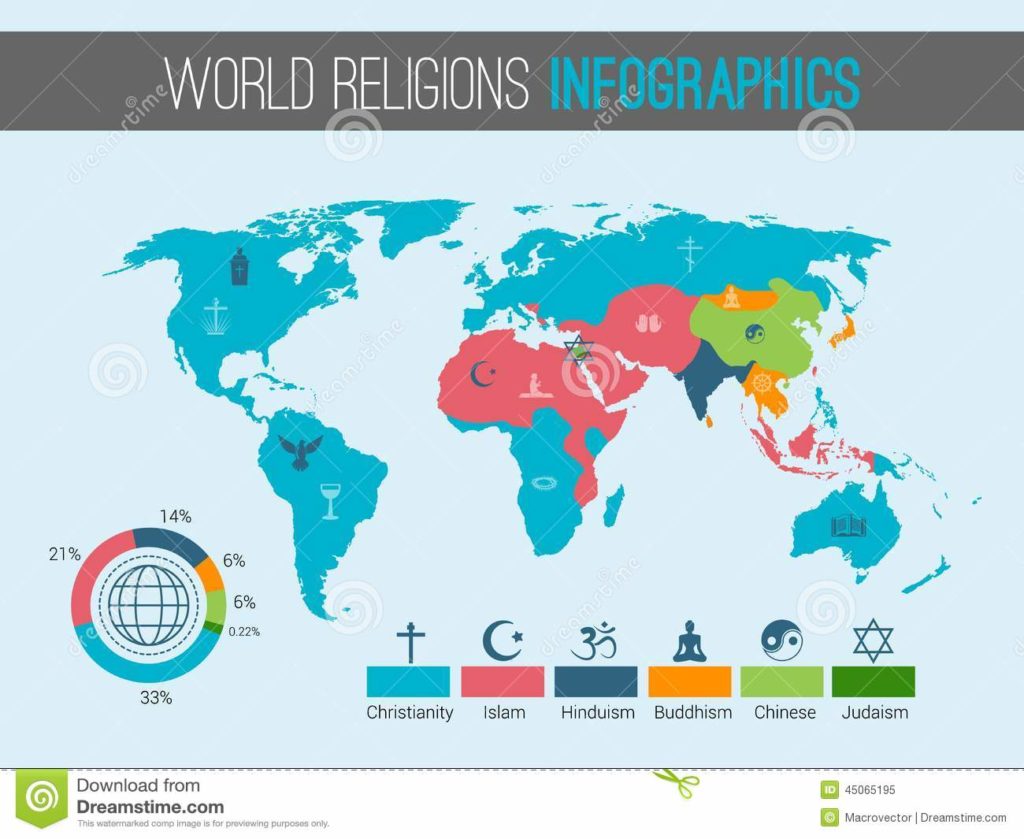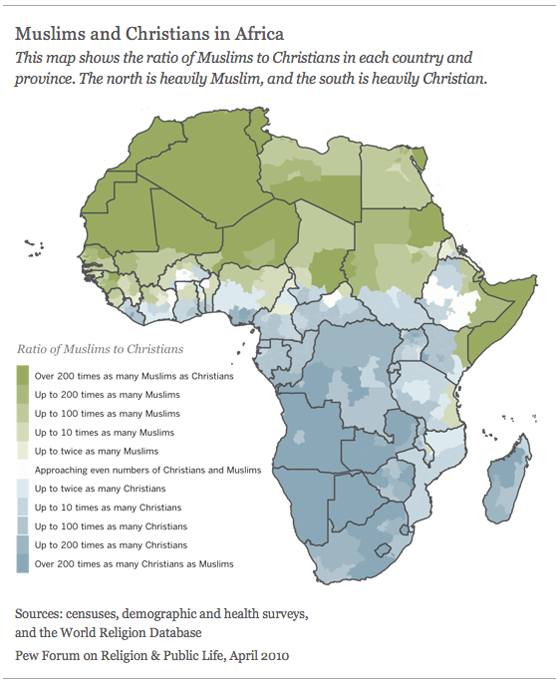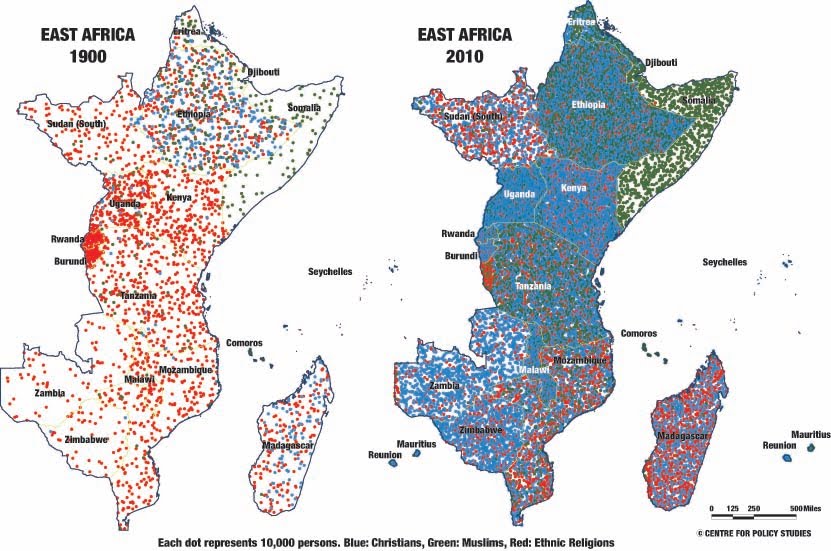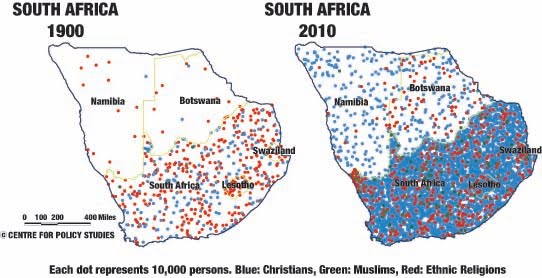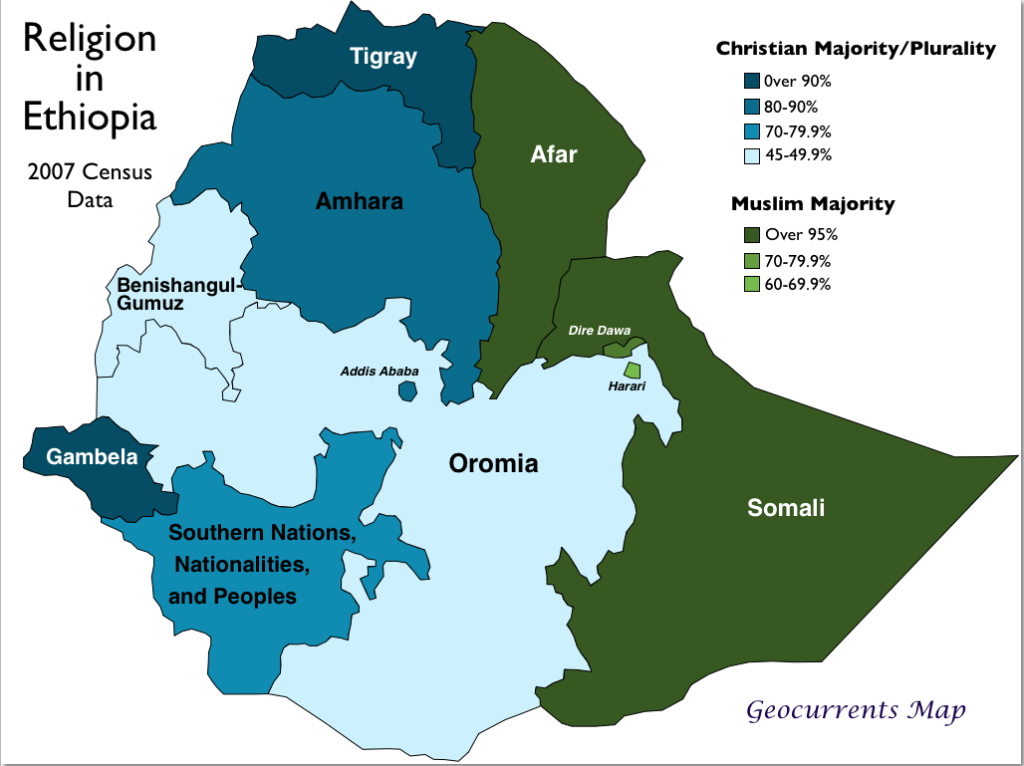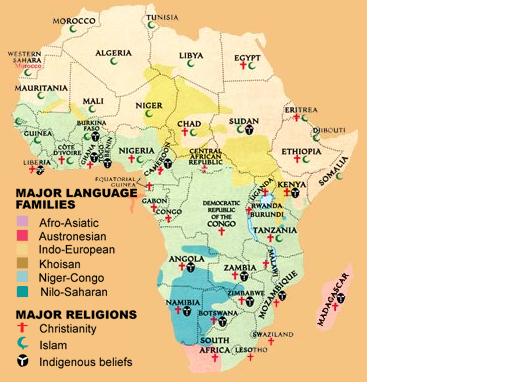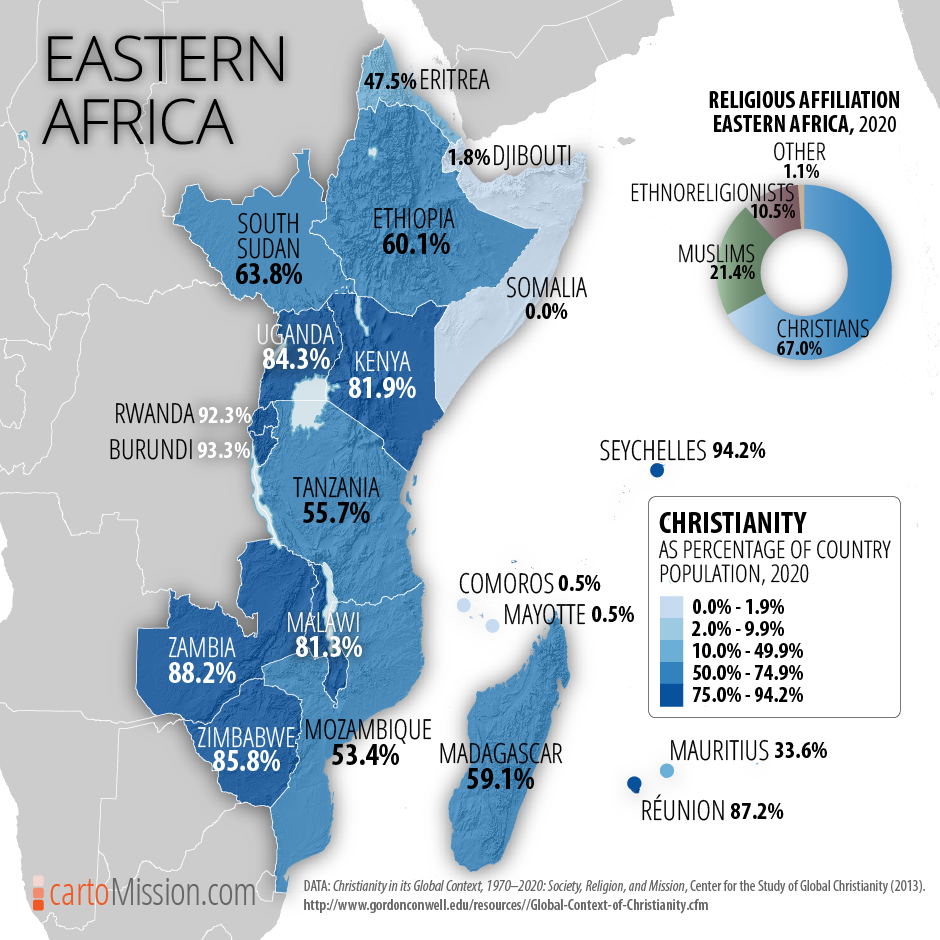Africa is rich in religious diversity with a wide variety of pre-colonial and colonial traditions and practices throughout the continent. This lesson will provide a brief overview of four broad religious traditions (indigenous, Judaisim, Christianity and Islam) that have shaped the religious landscape in Africa.
Lesson Objectives
- identify the history of four broad religious traditions (indigenous, Judaism, Christianity and Islam) in Africa,
- describe religious diversity in Africa
- evaluate the religious landscape in your selected African country
Studying Religion in Africa
Religion shapes and is shaped by human social experiences and interpretations of reality. In the 20th century, scholars began studying religion using an interpretive analytical framework that aimed to develop a better understanding of the symbols and meanings that comprise religion as a cultural system. In the his book, The Interpretation of Cultures (1966/73), Clifford Geertz defined religion as
‘a system of symbols which acts to establish powerful, pervasive and long-lasting moods and motivations in people by formulating conceptions of a general order of existence and clothing these conceptions with such an aura of factuality that the moods and motivations seem uniquely realistic.’
From Geertz’s perspective, religion provides frameworks for life that shape human behavior by offering a blueprint to understand deep questions that science and reason fail to answer and providing webs of meaning or frameworks to live life. In this way, studying religion provides a window into deeper meanings and experiences shared by people and cultures. This is what makes religion in Africa particularly relevant to the humanities of Africa.
Religion in Africa is multifaceted and has been a major influence on African art, culture and philosophy. Today, the continent’s various populations and individuals are mostly adherents of Christianity, Islam, and to a lesser extent several indigenous African religions. In Christian or Islamic communities, religious beliefs are also sometimes characterized by syncretism, the practice of mixing or integrating beliefs and practices of different religions.
Review the different religion maps in the gallery below and consider the spatial distribution of different religions throughout the African continent.
Abrahamic Religions (Judaism, Christianity and Islam) in Africa
Africa is home to the some of the earliest forms of Abrahamic religions (Judaism, Christianity and Islam) in the world, and Christianity and Islam are the predominant religions in Africa today. Many people often combine unique indigenous elements into Christian or Muslim beliefs and practices. That have been adapted to African cultural contexts and belief systems.
Christianity
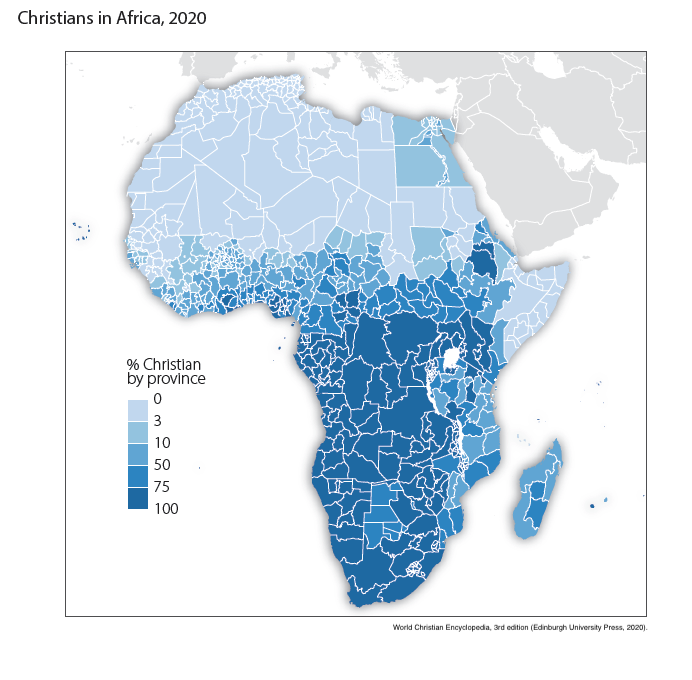
Christianity in Africa dates from the earliest Christian churches to the recent introduction of European and American Protestant denominations introduced through colonialism and contemporary technologies and missionizing. The Ethiopian Orthodox Tewahedo Church is one of the oldest Christian churches and is the second country historically (following only Armenia) to have officially proclaimed Christianity as its state religion (in AD 333). It is one of the few pre-colonial Christian churches in Sub-Saharan Africa, the Ethiopian Orthodox Tewahedo Church has a membership of about 36 million people, the majority of whom live in Ethiopia. It is a founding member of the World Council of Churches. The Ethiopian Orthodox Tewahedo Church is in communion with the Eritrean Orthodox Tewahedo Church, the Coptic Orthodox Church of Alexandria, the Malankara Orthodox Syrian Church, the Armenian Apostolic Church and the Syriac Orthodox Church. The spread of African people throughout the world has also contributed to the spread of he Ethiopian Orthodox Church. The music video below was created by the Ethiopian Orthodox Church in Edmonton, Canada.
Judaism in Africa

Judaism in Africa is represented mainly by two separate groups of people: Jews from Europe and the Middle East and indigenous Africans who claim Jewish or Israelite descent. Jews from the Middle East arrived in Africa before A.D. 400, settling mainly in North African countries such as Egypt and Algeria. Most worked as artisans, merchants, or laborers. In the late 1300s many Jews fled from Catholic Spain to Algeria, and in the 1600s and 1700s, Italian Jews joined them. However, when Arab leaders in Egypt and Algeria established anti-Jewish policies in the mid-1900s, most Jews left those countries. Today, South Africa is home to the largest population of Jewish immigrants in Africa.
Several African groups claim to be descended from the Ten Lost Tribes of Israel or other early Jewish groups. Most scholars believe these peoples were not originally Jewish but picked up elements of Jewish culture and religion through contacts with Christians or Muslims. These groups include the Lemba of South Africa and the Bayudiya of Uganda. The Beta Israel of Ethiopia claim to be descendants of Jews who moved to East Africa near the beginning of the Christian era. Although scholars now estimate that the Beta Israel arose in Ethiopia between the 1300s and 1500s, the group has nevertheless been recognized as Jews by the state of Israel. Over 45,000 members of the group have moved to Israel, members of Beta Israel in other African countries have claimed Jewish heritage in hopes of settling in Israel as well.
Many indigenous African groups have incorporated Jewish rituals and practices into their religious systems. Some point to ancient Biblical customs such as polygamy and ritual sacrifice to justify their traditional practices to Western missionaries. Other African groups have customs like those of Jewish cultures, but many scholars view such similarities as coincidental and not as evidence of direct Israelite influence.
Islam in Africa

According to Arab oral tradition, Islam first came to Africa with Muslim refugees fleeing persecution in the Arab peninsula. This was followed by a military invasion, some seven years after the death of the prophet Mohammed in 639, under the command of the Muslim Arab General, Amr ibn al-Asi. It quickly spread West from Alexandria in North Africa (the Maghreb), reducing the Christians to pockets in Egypt, Nubia and Ethiopia. Islam came to root along the East African coast some time in the 8th century, as part of a continuing dialogue between the people on the East coast and traders from the Persian Gulf and Oman. Like early Christianity, Islam was monotheistic, that is, Muslims worship only one God. Islam was a modernising influence, imposing a consistent order among different societies, strengthening powers of government and breaking down ethnic loyalties. Unlike Christianity, Islam tolerated traditional values, allowing a man to have more than one wife. For many, this made conversion to Islam easier and less upsetting than conversion to Christianity. In the early centuries of its existence, Islam in Africa had a dynamic and turbulent history, with reforming movements and dynasties clashing and succeeding each other. Gaining power depended on securing trade routes into gold-producing areas in Sub-Saharan Africa. Islamic rulers expanded north as well as south. In the last quarter of the 11th century, Islam dominated the Mediterranean world. In the 14th century the Black Death came from Europe and seriously undermined the social and economic life of North Africa, or the Maghreb, as it is known. However Islam remained the dominant religion. From the 16th to the 19th century, much of the Maghreb was under Ottoman rule. By the 1880’s, Islam had taken root in one third of the continent.
The BBC documentary below offers a brief overview of the history of Islam in Africa.
Indigenous African Religions
Indigenous African religions refer to the indigenous or native religious beliefs of African people prior to the European and Islamic colonization of Africa. Indigenous African religions are usually plural, varied, and usually informed by culture and ethnic identity. Africa encompasses a wide variety of indigenous beliefs. According to Dr J Omosade Awolalu, the term traditional refers to foundational beliefs and practices that have been handed down from generation to generation. Although religious customs are sometimes shared by many local societies, they are usually unique to specific populations or geographic regions. For example, the Yoruba religion has historically been centered in southwestern Nigeria, the Zulu religion in southern Africa, and the Igbo religion in southeastern Nigeria. This is why the word ‘religion’ can be problematic because it is a European concept that suggests that religion is separate from the other aspects of one’s culture, society, or environment. For many people in Africa, indigenous African spirituality refers to beliefs and practices that touch on and inform every facet of human life. It is a way of life, or spirituality, that informs everything in African society, including art, marriage, health, diet, dress, economics, and even death. Indigenous African religion cannot be separated from the everyday or mundane. For example, sickness in the indigenous African worldview is not only an imbalance of the body, but also an imbalance in one’s social life, which can be linked to a breakdown in one’s kinship and family relations or even to one’s relationship with one’s ancestors.
African religion is tied to African culture, and as a result, indigenous Africa religions are broadly diverse, including the ways that each approaches diety and the supernatural. There is also a multiplicity of ways that indigenous African spiritualities conceive of deities, gods, and spirit beings. While some African cosmologies have a clear idea of a supreme being, other cosmologies do not. The Yoruba, for example, do have a concept of a supreme being, called Olorun or Olodumare, and this creator god of the universe is empowered by the various orisa [deities] to create the earth and carry out all its related functions, including receiving the prayers and supplications of the Yoruba people.
Despite the salience of spirituality in African ways of life, indigenous African spirituality is endangered in the same ways and reasons that indigenous African languages and cultures are declining. The amount of devotees to indigenous practices has dwindled as Islam and Christianity have both spread and gained influence throughout the continent. In 1900 most Africans in sub-Saharan Africa practiced a form of indigenous African religions. Today, it is estimated that only 10% of the population (approximately 100 million) engages in indigenous beliefs and practices exclusively. Since most African religions are not monotheistic (worshipping only one god), many African religions have incorporated Christian and Muslim beliefs and practices. At the same time, many Christian and Muslim adherents in Africa also participate in indigenous spiritual practices in day to day living such as visiting local shrines, venerating the dead, applying healing rituals and medicine, magic, divination, and harmonizing nature with the spirit.
African Religion Worldwide
Mostly due to mass enslavement of African people starting in the 15th century — indigenous African religions have spread and taken root all over the world, including in the United States and Europe. Some of these African diaspora religions include Cuban Regla de Ocha, Haitian Vodou, Jamiacan Rastafarianism, Hebrew Israelites, Nation of Islam, and Brazilian Candomble. A community deep in the American Bible Belt in Beaufort County, S.C., called Oyotunji Village practices a type of African indigenous religion, which is a mixture of Yoruba and Ewe-Fon spiritual practices. African religion also influenced American forms of Christianity such Pentacostalism and the gospel music which has in turn spread back to Africa through missionizing and televised sermons.
Religion in African Humanities
The religious landscape throughout the African continent reflects the unique social and historical circumstances experienced by peoples and cultures throughout the entire continent. Indigenous spiritualities are embedded in African culture, identity and ways of living, and they dominated the continent until the spread of Islam across northern Africa during the 7th century and the colonization of Africa by Christian Europeans in the 20th century. Today, the continent hosts a richly diverse religious community comprised of Christians, Muslims, Jews and adherents of indigenous religious practices. The migration of African people throughout the world, particularly during the mass enslavement of African people beginning in the 15th century, has also contributed to the global spread of African religion as well as the emergence of African-influenced religious practices. Exploring African religion helps develop a better understanding of the ideas, beliefs, and world views that inform African humanities.
References and Resources
- African Religion Resource Guide, Georgetown University
- Indigenous African Religions
- Islam in Africa
- The Spread of Islam in Africa. Ancient History Encyclopedia
- Christianity in Africa
- Transformation of the Religious Profile of Africa, Center for Policy Studies
- Conflicts Between African Traditional Religion and Christianity in Eastern Nigeria: The Igbo Example
- “AFRICAN RELIGIOUS BELIEFS – Tewahedo – Palo – Serer – Tijaniyyah – Vodon
- Dr J.O. Awolalu, Studies in Comparative Religion Vol. 10, No. 2. (Spring, 1976).
- Gordon Conwell Theological Seminary, African Christianity, 2020
- Vontress, Clemmont E. (2005), “Animism: Foundation of Traditional Healing in Sub-Saharan Africa”, Integrating Traditional Healing Practices into Counseling and Psychotherapy, SAGE Publications, Inc., pp. 124–137,
- Mbiti, John S (1992). Introduction to African religion. East African Publishers.
- “US study sheds light on Africa’s unique religious mix”
- The Spirituality of Africa, Harvard Gazette.
- https://www.pewforum.org/2012/08/09/the-worlds-muslims-unity-and-diversity-1-religious-affiliation/#identity
- “Overview Of World Religions”. General Essay on the Religions of Sub-Saharan Africa. Division of Religion and Philosophy, University of Cumbria. Archived from the original on 2007-12-09.
- “Hindu temples in Tanzania”
- “UGANDA 2016 INTERNATIONAL RELIGIOUS FREEDOM REPORT”
- Mugambi, Jesse Ndwiga Kanyua (1992). Critiques of Christianity in African literature: with particular reference to the East African context
For Discussion in Canvas
Use the information in the Religion lesson to describe the religious landscape within your selected country. Include the indigenous as well as colonial religions and the estimated number of people (or percentage of the population).

